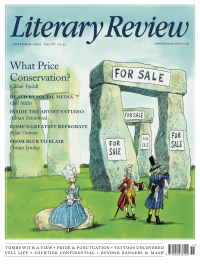David Anderson
Was Lockdown Lawful?
Emergency State: How We Lost Our Freedoms in the Pandemic and Why It Matters
By Adam Wagner
The Bodley Head 240pp £14.99
On the evening of 23 March 2020, the prime minister, Boris Johnson, gave the British people what he described as ‘a very simple instruction’: ‘you must stay at home.’ No legal authority existed for any such instruction. Cover arrived three days later, in the shape of regulations made under the Public Health Act 1984. These had been drafted in haste and had not been presented to Parliament for scrutiny. The pattern was set for two years of extreme and unprecedented restrictions on our freedoms of movement, assembly and private life.
Although severe and sometimes arbitrary in their application, the Covid restrictions were for the most part accepted by the British public. Many were grateful for the protection they offered, while an unattractive minority appeared to relish their enforcement. It is true that Derbyshire police were ridiculed, in the early days of the pandemic, for using drone footage to shame a couple who had driven to walk their dog in the deserted Peak District. But dislike of snoopers, snitches and over-zealous enforcers was as nothing compared to the popular fury directed towards rule breakers – particularly when they were in the public eye. Johnson had initially delayed lockdown, mistakenly believing that a freedom-loving public would not tolerate it for long. But it was his own insouciance in the face of the rules, not the restrictions themselves, that led to his early political demise.
Adam Wagner is a London barrister and human rights blogger who came to public attention during the pandemic as an expert on the UK’s constantly changing rules and guidance. He chronicled their twists and turns on social media and was beamed into the nation’s studios to explain such issues

Sign Up to our newsletter
Receive free articles, highlights from the archive, news, details of prizes, and much more.@Lit_Review
Follow Literary Review on Twitter
Twitter Feed
In 1524, hundreds of thousands of peasants across Germany took up arms against their social superiors.
Peter Marshall investigates the causes and consequences of the German Peasants’ War, the largest uprising in Europe before the French Revolution.
Peter Marshall - Down with the Ox Tax!
Peter Marshall: Down with the Ox Tax! - Summer of Fire and Blood: The German Peasants’ War by Lyndal Roper
literaryreview.co.uk
The Soviet double agent Oleg Gordievsky, who died yesterday, reviewed many books on Russia & spying for our pages. As he lived under threat of assassination, books had to be sent to him under ever-changing pseudonyms. Here are a selection of his pieces:
Literary Review - For People Who Devour Books
Book reviews by Oleg Gordievsky
literaryreview.co.uk
The Soviet Union might seem the last place that the art duo Gilbert & George would achieve success. Yet as the communist regime collapsed, that’s precisely what happened.
@StephenSmithWDS wonders how two East End gadflies infiltrated the Eastern Bloc.
Stephen Smith - From Russia with Lucre
Stephen Smith: From Russia with Lucre - Gilbert & George and the Communists by James Birch
literaryreview.co.uk